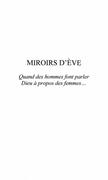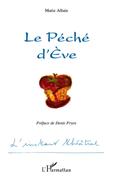11 Results for : d'eve
-

Allain, Marie: Le Péché d'Eve
Erscheinungsdatum: 29.05.2020, Medium: Taschenbuch, Einband: Kartoniert / Broschiert, Titel: Le Péché d'Eve, Autor: Allain, Marie, Verlag: Editions L'Harmattan, Sprache: Französisch, Rubrik: Belletristik // Lyrik, Dramatik, Essays, Seiten: 80, Informationen: Paperback, Gewicht: 121 gr, Verkäufer: averdo- Shop: averdo
- Price: 11.00 EUR excl. shipping
-

La chanson d'eve
PARADIS|PRIMA VERBA|ROSES ARDENTES|COMME DIEU RAYONNE|L'AUBE BLANCHE|EAU VIVANTE|VEILLES TU MA SENTEUR DE SOLEIL|DANS UN PARFUM DE ROSES BLANCHES|CREPUSCULE|O MORT POUSSIERE D'ETOILES- Shop: Notenbuch
- Price: 39.99 EUR excl. shipping
-

-

Ni d'Eve ni d'Adam
Nach 'Mit Staunen und Zittern', berichtet Amélie Nothomb in ihrem neuen Roman über eine erstaunliche Begegnung in Tokio und eine aufregende Einführung in die Liebe und die japanische Kultur.- Shop: buecher
- Price: 8.99 EUR excl. shipping
-

-

-
Mirages/Chanson d'Eve
Charlotte de Rothschild (Sopr), Adrian Farmer (Pno)- Shop: odax
- Price: 14.91 EUR excl. shipping
-
-
Bonne Chanson Belle Poque
A double album of six major song cycles by Fauré and Debussy, composed during the Belle Epoque to poems of Baudelaire, Verlaine, Van Lerberghe and others. Cycles include: 'La Bonne Chanson', 'La Chanson d'Eve' and 'Le Jardin Clos' by Fauré, and 'Ariettes Oubliées', 'Cinq Poèmes de Baudelaire', 'Deux Romances', and 'Chansons de Bilitis' by Debussy. The album is also downloadable from iTunes. REVIEW: 'Duo Orde and Cohen aren't half bad ... Jonathan Cohen is no hack when it comes to accompanying, and ... their synergy is close and comfortingly sympathetic. Having become used to her sound ... one starts to appreciate her nimble way around the tricky melodic lines in something like Faure's Green - she stays impeccably in tune the whole time, and almost entirely avoids reaching toward the notes, hitting them on the nose with considerable accuracy, a quality which I find beyond price.' --Dominy Clements, MusicWeb International.- Shop: odax
- Price: 32.27 EUR excl. shipping
-
La Chanson D'eve
Gabriel Fauré, La Chanson d'Eve, op. 95 Katherine Bergeron, voice, Dana Gooley, piano. Recorded in Grant Recital Hall, Brown University, June 2009. 1. Paradis 2. Prima Verba 3. Roses ardentes 4. Comme Dieu rayonne 5. L'Aube blanche 6. L'Eau vivante 7. Veilles-tu, ma senteur de soleil 8. Dans un parfum de roses blanches 9. Crépuscule 10. O Mort, poussière d'étoiles Fauré began composing La Chanson d'Eve in 1906, marking what some critics considered a "new manner," and his first real turn to modernism. He started from a book of poems by the same name published two years earlier by the Belgian symbolist Charles Van Lerberghe. The ten poems he set to music together retell the story of Creation, though with a crucial twist. This time there is no Adam, no forbidden fruit, no other sin but speech. In the beginning God created only woman: Eve awakens in a dream of Paradise and, before she knows it, she is singing. Or, as she puts it, she feels a dream resounding through her. "How it sings in my voice," she announces near the beginning, "this long murmuring soul of forest and spring!" Here, in effect, was a representation of the original rustle of language and her exclamation is both announcement and question. For Eve does not know how it happens. She "sings like a child," as one commentator put it, "sings without thinking." She utters her feeling and feels her utterance, wondering at all the new sensations-the sounds in her head, the breath on her lips. And in this unintentionally resonant moment, the word (and the world) felt very good indeed. This was, of course, a marvelous premise for a song cycle but, as Fauré tells it, the good feeling does not last long. You can imagine how it goes: Eve soon begins to think, to question, to bend her words according to her will. But none of this will satisfy. She ends up asking more and more. By the sixth song her thought goes feverish, by the eighth, benumbed. Predictably, as she sees her dream recede, the tale is nearly over. In the dark night of the ninth song, Eve is alone, desperate now for the lost murmur of Paradise ("I listen until it hurts," she cries). And, in the tenth, she finds what she is looking for, although essentially at her peril. For death alone will enable it's return: she gets her wish, and reclaims her Paradise, only by giving up her voice. The ten songs are connected not only through this poetic narrative but also through two musical motifs in the piano line. Both make an appearance in the opening song, "Paradis," which functions like a vast theatrical tableau for the whole set. A rising, naked arpeggio in the first measures announces the stillness of Paradise and the dawning of the "first morning of the world." Later that line warms and blossoms into a fecund chromatic figure pointing to the "blue garden" of Paradise. These two figures recur throughout the cycle, with a dream's surreal logic, both to comment on the developing narrative and to remind Eve exactly where she is. -Katherine Bergeron.- Shop: odax
- Price: 19.23 EUR excl. shipping



